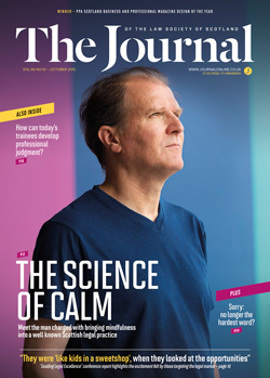Cultivating judgment

This article is based on research I have carried out in recent years into the importance of professional judgment and how it is developed.
My interest in this topic stemmed from my concern that, while many current marketplace pressures seem to require us to “
I also wanted to find out the effect of increasing
Trainees used to be able to build their confidence and abilities by being given the type of routine,
Rather than consider all of this in the abstract, I decided to investigate how Scottish firms were responding to these changes to work practices, as well as to see if I could identify relevant examples from other jurisdictions and professions.
The aim of this article is to share my findings and promote a discussion about how to help our trainees and newly qualified people develop the ability to exercise good professional judgment that they need to practise successfully.
What is professional judgment and why is it important?
One of the core skills of lawyers is the ability to provide solutions to client problems. Clients come to us with a variety of expectations and finite resources. Our role is to help them identify the options they have and, based on our experience, select the most palatable choice available. Once they make their decision, we have to enable them to implement it in the most effective way possible. This requires us to exercise our judgment based on our previous experience.
It became apparent during the course of my research that, while people said the development of professional judgment was important, even to the extent that they would not make someone a partner or director who was not able to exercise it, defining it was more difficult. It seemed to be assumed that we all know what is meant, akin to recognising an elephant when we see it. Rather than provide a definition, people tended to respond by describing its component elements, which usually included being able to:
- gather accurate information (both relevant facts and the law);
- assess the risks to the client and the firm;
- identify a range of options which were achievable in relation to the client’s resources;
- discuss these with the client in a way that the client understood their implications; and
- implement the best solution for that specific client.
Everyone agreed that professional judgment can only be developed through gaining practical experience of context and an understanding of the accepted norms of the relevant
The basis of my research
Given that a significant percentage of Scottish trainees are employed by large firms, I concentrated my research on them. I felt that as these firms had made a specific decision to recruit trainees, they would have proper systems in place to support them and work available for them to undertake. I sent those who responded to my request to interview their training partners, HR directors, trainees and supervisors, a set of questions in advance. These included:
- How are you developing the professional judgment of your trainees?
- Why do you think that is important?
- How did you develop it yourself?
- What processes do you use?
- Why do you use them?
To provide comparisons with firms working under the same market pressures, I interviewed a number of regional law firms based in the north west of England which were of a similar size and structure to the Scottish firms. I also interviewed people involved in legal education and training in other jurisdictions, including Canada and Australia. To widen the scope of my findings, I wanted to speak with other professions who operated in a similar way to law firms and were facing the same market pressures to reduce the cost of their chargeable time and become more specialised, so I chose architects, surveyors and civil engineers.
What did I find?
First of all, the good news. I found that the UK legal profession provided much more of a work-based framework for its vocational training than the other jurisdictions. We have invested time in developing the PEAT2 structure and processes that employers and trainees can use to map and demonstrate progress and identify aspects that need further development prior to seeking admission.
In addition, firms described to me that their trainees were employed to be part of their service delivery. This offered the potential of providing them with direct access to clients and personal responsibility for their own files.
However, there were some aspects of this that were causing problems. Most firms rotated trainees around three or four different
Some firms kept their trainees in one department and under one supervisor for the whole of their training period and
Another problem in relation to the development of professional judgment stemmed from the fact that it is not stated explicitly in the PEAT 2 learning outcomes. As I mentioned above, while experienced people felt that it was a core skill of good lawyers, most people found it difficult to define it – and indeed some said to me that it was not possible to “teach it”, as some people “got it” and others never seemed to. The end result was that many of the trainees I interviewed had never considered its relevance to their career progression or ability to practise successfully, and without any explicit mention of it, no one was assessing their ability to develop it.
When I asked the supervisors how they had developed their own professional judgment, most explained the traditional “master-apprenticeship” model of working under the close supervision of an experienced practitioner who took the time to explain what he or she was doing, what choices were available in that particular client situation and, most importantly, how they arrived at those choices. When I asked them to reflect on whether they adopted the same process with their own trainees, many said that there simply was not the time to do this now.
The other professions I spoke with adopted a vocational emphasis in all of their pre-admission education and training. This resulted in strong working relationships between academia and practice, with work placements and practical undergraduate projects commonplace. Graduate recruiters formalised their internal training structure and the regulatory bodies trained those who sat on their admission panels.
Interestingly, they were surprised that we only require two years of vocational training before formal admission. They all felt that a minimum of four to five years of work experience should be required before seeking chartered status. They expected employers to take an active part in preparing their trainees for entry to their profession by providing them, in addition to a supervisor who allocated work and reviewed their performance, with a mentor who helped to ensure that they were exposed to a range of clients and practical projects, with increasing levels of responsibility and accountability, and helped them with career progression.
Employers felt that it reflected on them whether their trainees were successful on the admission interviews that they also have to undergo, so ensured that the trainees were given direct responsibility for running client
What do we need to ensure?
As I mentioned, my research indicates that the UK profession leads the way in legal education by offering its trainees the opportunity to learn and develop a lot of abilities and skills during their two-year contract, so we need to make sure that the PEAT 2 processes work effectively. Firms should ensure that their use of seat rotations allows trainees to build skills incrementally. In particular, there should be a handover between supervisors.
In addition, firms should consider appointing a mentor who works with each trainee over the two years. This would allow the supervisors to concentrate on performance improvements, with the mentor focusing on enhancing skills that have already been achieved, through for example the choice of the next seat rotation, as well as career options and objectives post-completion of the training contract.
This would allow trainees to recognise their learning at each stage and build personal confidence. It would also be useful to talk more explicitly about the importance of developing professional judgment and its constituent elements, perhaps showing trainees where it fits within the competencies and attributes of associates, partners and/or directors.
Finally, and more provocatively, my findings indicate that we are out of step with other professions in relation to recognising relevant experience. We know that doctors take many years to achieve full accreditation of their specialisms but, much more significantly and relevantly to our business model, the professions that work in a competitive environment where time has to be charged and recovered and risks have to be managed, require a minimum of four to five years’ experience of practice before a candidate can seek formal admission to their specialism. In my view, we need to look at what we are doing when we grant our applicants a full practising certificate after only two years’ work experience.
Fiona Westwood
Fiona runs her own management and training consultancy, specialising in working with professional service firms. Since 2000, she has been involved in postgraduate vocational skills development. She is
In this issue
- Land registration and leases
- Disharmony and disharmonising
- FCA reviews: not the end of the story?
- A host of claims for guests
- Pensions auto-enrolment: some clarity for trainees
- Reading for pleasure
- Opinion: Stewart Cunningham and Nadine Stott
- Book reviews
- Profile
- President's column
- KIR: have your say
- People on the move
- You and whose mind?
- Deil tak the hindmost
- Cultivating judgment
- Women: paths to power
- Sorry: no longer the hardest word?
- Fairness in the balance
- Minimum pricing: the latest
- Planning: shakeup on the way?
- New burdens for employers?
- Scottish Solicitors Discipline Tribunal
- Ancillary rights as real rights
- Life at the cutting edge
- One form if firms hold client money
- Further fraud alerts issued
- Law reform roundup
- Guidance: duties re legal rights
- From the Brussels office
- Rights in chaos: asylum seekers and migrants in the EU
- Mirror wills: can I change?
- Renewal: the impetus for review
- Ask Ash
- The day of minimis is here
- If it ain't broken...?
- The voice of youth






